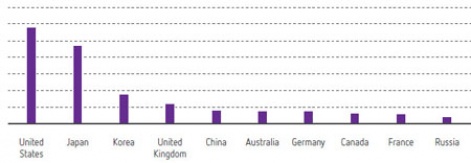The phrase 'May you live in interesting times,' is a western truism about Chinese culture that's without historical basis.
It's ironic, then, that it's Chinese mobile game developers who are living through the most 'interesting of times'.
In western markets, development and deployment tools are robust and cheap, app distribution is straightforward, and there are there are hundreds of millions of hungry players and wealthy payers.
For developers, the only problem is there are no structural problems. It's a level playing field where the only issue is the amount of competition; perfect market conditions for meritocracy.
Most games don't hit big (as it ever was), but those that do hit bigger than their creators ever imagined.
As one UK prime minister is misquoted as telling his ungracious electorate - "You've never had it so good".
C-c-c-challenges
When it comes to the Chinese mobile games market, however, almost every part of the value chain is fragmented and challenging.
Android is the largest and fastest growing platform, but the lack of an official app store means distribution is split between carriers, internet platforms, ISPs, anti-virus software providers and other popular websites who provide sideloading channels for the increasingly large files that are too big for over-the-air download.
Network quality is patchy, billing is fragmented, while issues such as piracy, cloning and government control bubble along in the background.
Perhaps the biggest issue, however, is the very quality of Chinese mobile games.
The legacy of the years when the Chinese games market was dominated by massively multiplayer PC games - typically highly culturally-specific RPGs themed around the Three Kingdoms era - Chinese mobile games tend to be heavy on repetition and light on graphical quality and usability.
It was something highlighted at the ChinaJoy 2013 conference where the VP of distribution outfit Qihoo 360 Chen Jie told developers they needed to focus much more on the user experience and retention rates of their games.
Similarly, Zhang Peng, GM of China Telecom's game operation base, said Chinese developers were too focused on hardcore games, mainly because of a misguided focus on high ARPU rates.
Too big, will fail
More generally, this PC MMOG legacy is also reflected in terms of the corporate structure of the Chinese game development scene.
With a lot of investment cash injected in previous years, many companies grew too large in the MMOG era. Now, with subscriptions and sales in these markets decreasing fast, such companies are having to reinvest and reskill fast to make mobile games.
And it's not just small and medium -sized companies either. Publicly-owned outfits such as Tencent and KongZhong are struggling to make the change, although the situation has proved to be an opportunity for others.
After warning his fellow developers that he thought the "majority of Chinese mobile game companies would die out", LineKong CEO Wang Feng is now looking forward to taking his company public with a Hong Kong IPO rumoured.
Still, given that LineKong raised $30 million in VC money during the bubble PC MMOG era, and almost went bust in 2012, it's could be argued the planned IPO is a case of striking while a new iron is attractively hot.
LineKong's mobile MMORPG The Legend of King is reportedly making over RMB 45 million ($7 million) a month.
Find your perspective
When it comes to the Chinese market, the bottomline is that it's the sheer scale of a nation of 1.3 billion that makes otherwise sane men and women go crazy.
China is already reckoned to be the largest smartphone market globally in terms of devices and is the fifth largest mobile market in terms of revenues, with the likelihood it will overtake the UK and South Korea over the next 12 months.

Distimo's August 2013 breakdown of top app markets by revenue
Yet, as with the debate about if/when China will overtake the US in terms of Gross Domestic Product (the basic measure of a national economy), the US and Japan remain substantially larger app markets in financial terms than China; something that's not going to change anytime soon.
According to the most optimist Chinese sources, the country's smartphone gaming market could be worth around $1.5 billion in 2013, perhaps rising to $4.3 billion in 2015.
(Placing this in context, the official size of the Chinese mobile games market in the first half of 2013 was reckoned to be $410 million.)
And what shouldn't be discounted either is that market fragmentation means that the net revenue of a developer is smaller than 70 percent western developers receive working through the likes of the App Store or Google Play.
Of course, this isn't to say that the various thirdparty apps stores, distributors, publishers and the like shouldn't get a cut, only that for the content creator, China is not yet a high margin market.
Time to consolidate
What should we look forward to then?
It's clear that the Chinese mobile games market won't suddenly become like western markets. Even if Google Play was allowed and shipped with every Android phone, it wouldn't make much difference now. The distribution die has been cast.
But consolidation will happen in all sectors from developers and publishers to big infrastructure deals such as Baidu acquisition of 91 Wireless, one of the main Android app distribution channels in China.
Similarly, moves such as Tencent's rolling out of its WeChat mobile social network will impact the market. Many Chinese commentators expect it to follow a similar adoption rate to Kakao or LINE's game services, maybe accounting for 20 percent of the Chinese mobile games market by the end of 2013.
However, unless the app distribution market becomes smoother, providing a more level playing field that rewards the best content creators - not just the best connected developers - these interesting times will be more of a curse than a blessing.



















